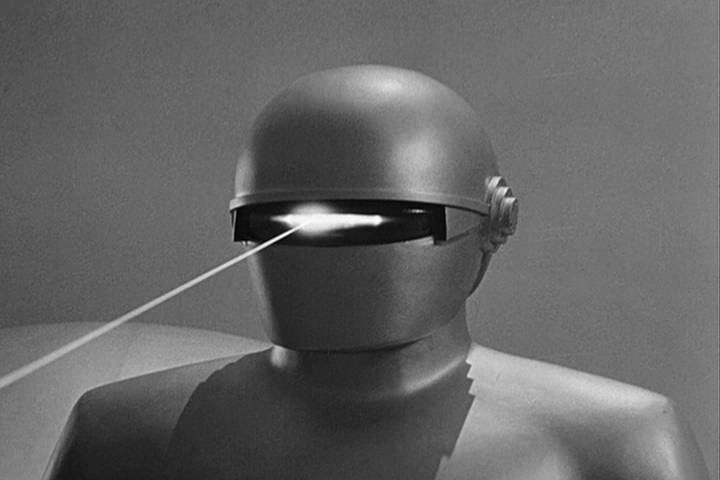
The Night the Earth Stood Still
F. T. Rea
Richmond.com
Monday, January 03, 2000
To Whom It May Concern: Greetings from the waning hours of 1999 in Richmond, Virginia, USA. And, in case it matters, on Earth.
Sitting at a table outside of Puddn'Heads Coffee House on an Indian Summer morning in November, I read a Y2K paranoia article with smug satisfaction as I consumed my daily dose of black coffee.
When I noticed a woman walk by with a mischievous Jack Russell Terrier at her side, I paused to think - who actually believed that anything significant was going to happen just because another page of the Christian calendar was about to be removed and tossed into the cosmic trash bin of time?
The woman looked a bit like Patricia Neal, which brought to mind "The Day the Earth Stood Still," the 1951 sci-fi classic that anticipated a modern society's panic from the sudden loss of all electricity.
Alas, that was only a few weeks ago. A few weeks ago, when I felt so unconcerned about Y2K bugs.
Now my nonchalance about this Y2K business has evolved into something else. Tonight, sitting at my keyboard on Dec. 16, I've started to get spooked by contemplating what's actually going to go down when zillions of pulsing gizmos sense that we have crossed the border between 1999 and 2000.
While I am anything but knowledgeable about matters pertaining to computers and the Internet, the fact is I use them both all the time. Frankly, I don't like to think about a world without word processing and e-mail.
At this point, I don't even know whether my computer will be of any use to me once we cross the great divide. I've been told on some good authority, there is a chance my old 486 may just seize up.
Of course that's a practical fear. Being a writer, I'm naturally concerned about my livelihood.
What is this I'm reading? You ask.
It's days after Y2K. We all know by now that (pick one) a) the Earth has been reduced to a still-glowing fireball; or b) it was all a big bore and we'll never fall victim to mass-hysteria again.
Well, reader, you're one up on me. The real problem looming as I type these words is that I have no idea that modern civilization isn't going to melt down over this splendidly ironic glitch in the system. I'm still weeks behind you, still left to wonder if the lights really will go out at midnight, Jan. 1, 2000. Still left to wonder if it's possible that our whole deal could go down the drain.
So think of this piece as a quaint time capsule beamed into the future - January, 2000.
Despite my Y2K blues, however, I believe that this article will almost certainly appear online as scheduled. I fully expect that you are sitting in front of your monitor reading this on richmond.com.
Then the laugh will be on all the people who admitted they were preparing for all manner of catastrophe. And, I suppose to some extent that will mean me. Fine. I'll be laughing then too.
I hope.
Nonetheless as I sit here, sipping on a bitter Pale Ale, I have no trouble imagining that roving bands of thugs could be out the first night without electricity. Looters could come out of the woodwork. If our toilets won't flush, our phones don't work, and all forms of mass communication are kaput, people could wig out big time.
Then, anything from the familiar post-apocalyptic menu could happen. Yes, I admit it - I'm getting a little worried.
In fact, I'm not at all sure when, or even if, anyone is actually going to read this. It has already occurred to me that maybe the only real point to my writing these paragraphs is to keep my squirmy consciousness occupied.
For that matter, every time a wordsmith plies his trade there is some leap of faith involved: Yes, it will be published. And yes, someone will read it.
Fetching yet another perfectly chilled ale, it just struck me that, for all I know, the entire power grid has gone down hard by the time you're supposed to be reading this.
And you, my dear reader, you could be someone who has stumbled across this material decades into the future. You could be an archeologist studying the artifacts of what remains of civilization circa 1999.
Or, perhaps you are reading this less than a month into the new millennium.
You are huddled in a icy bunker. Your generator-powered PC's monitor is providing the only light for you to pry open the precious can of beans you found in a pile of rubble.
And, with good reason you are reading this little essay with one eye peeled on the only doorway. Your revolver, as always, is at your side. You still have three bullets left.
You could even be the last human being alive. On the other hand, maybe you are not human at all. You could be from ...
Maybe everything is still, frozen timelessly in place.
OK, calm down.
If that is the case, there still could be one last chance. I know it sounds silly, but try saying the following phrase aloud: "Klaatu Barada Nikto."*
How could it hurt?
"Klaatu Barada Nikto!"
From 1999, this is F. T. Rea, over and out ...
Note: *The key line from "The Day the Earth Stood Still" that commanded the all-powerful robot Gort to switch the world's machines back on.






